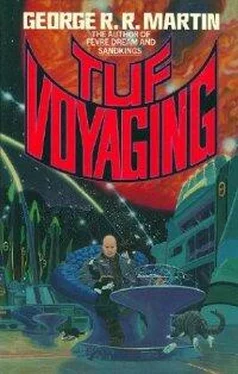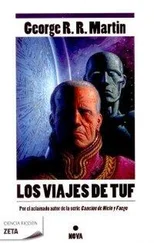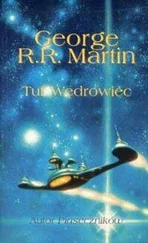The thin man shrugged. “Animals do die, you know. Can’t be helped. Fang and claw and all that, yesyes, that’s their destiny. I’ve had to grow accustomed to watching my best get slaughtered right in front of my eyes. But that’s what I’ve come to talk to you about, Tuf.”
“Indeed,” said Haviland Tuf.
“My name is Herold Norn. I am the Senior Beast-Master of my House, one of the Twelve Great Houses of Lyronica.”
“Lyronica,” Tuf stated. “The name is not entirely unfamiliar to me. A small, sparsely settled planet, I seem to recall, of a somewhat savage bent. Perhaps this explains your transgressions of civilized manners.”
“Savage?” Norn said. “That’s Tamberkin rubbish, Tuf. Damned farmers. Lyronica is the jewel of this sector. You’ve heard of our gaming pits, haven’t you?”
Haviland Tuf scratched Dax behind the ear once more, a peculiar rhythmic scratch, and the tomcat slowly uncurled, yawning, and glanced up at the thin man with large, bright, golden eyes. He purred softly.
“Some small nuggets of information have fallen in my ears during my voyagings,” Tuf said. “Perhaps you would care to elaborate, Herold Norn, so Dax and I might consider your proposition.”
Herold Norn rubbed thin hands together, nodding. “Dax?” he said. “Of course. A handsome animal, although personally I have never been fond of beasts who cannot fight. Real beauty lies in killing-strength, I always say.”
“An idiosyncratic attitude,” Tuf commented.
“No, no,” said Norn, “not at all. I hope that your work here has not infected you with Tamberkin squeamishness.”
Tuf drained his mug in silence, then signaled for two more. The barkeep brought them promptly.
“Thank you,” Norn said, when the mug was set golden and foaming in front of him.
“Proceed, sir.”
“Yes. Well, the Twelve Great Houses of Lyronica compete in the gaming pits. It began—oh, centuries ago. Before that, the houses warred. This way is much better. Family honor is upheld, fortunes are made, and no one is injured. You see, each house controls great tracts, scattered widely over the planet, and since the land is very thinly settled, animal life teems. The Lords of the Great Houses, many years ago during a time of peace, started to have animal fights. It was a pleasant diversion, rooted deep in history. You are aware, maybe, of the ancient custom of cock-fighting and the Old Earth folk called Romans who would set all manner of strange beasts against each other in their great arena?”
Norn paused and drank some ale, waiting for an answer, but Tuf merely stroked Dax and said nothing.
“No matter,” the thin Lyronican finally said, wiping foam from his mouth with the back of his hand. “That was the beginning of the sport, you see. Each house has its own particular land, its own particular animals. The House of Varcour, for example, sprawls in the hot, swampy south, and they are fond of sending huge lizard-lions to the gaming pits. Feridian, a mountainous realm, has bred and championed its fortunes with a species of rock-ape which we call, naturally, feridians. My own house, Norn, stands on the grassy plains of the large northern continent. We have sent a hundred different beasts into combat in the pits, but we are most famed for our ironfangs.”
“Ironfangs,” Tuf said. “The name is evocative.”
Norn gave a sly smile. “Yes,” he said proudly. “As Senior Beast-Master, I have trained thousands. Oh, but they are lovely animals! Tall as you are, with fur of the most marvelous blue-black color, fierce and relentless.”
“Might I assume your ironfangs to be of canine descent?”
“But such canines,” Norn said.
“Yet you require from me a monster.”
Norn drank more of his ale. “True, true. Folks from a dozen near worlds voyage to Lyronica, to watch the beasts fight in the gaming pits and gamble on the outcome. Particularly they flock to the Bronze Arena that has stood for six hundred years in the City of All Houses. That’s where the greatest fights are fought. The wealth of our Houses and our world has come to depend on this. Without it, rich Lyronica would be as poor as the farmers of Tamber.”
“Yes,” said Tuf.
“But you understand, this wealth, it goes to the houses according to their honor, according to their victories. The House of Arneth has grown greatest and most powerful because of the many deadly beasts in their varied lands; the others rank according to their scores in the Bronze Arena.”
Tuf blinked. “The House of Norn ranks last and least among the Twelve Great Houses of Lyronica,” he said, and Dax purred more loudly.
“You know?”
“Sir. It was obvious. Yet an objection occurs to me. Under the rules of your Bronze Arena, might it not be considered unethical to purchase and introduce a species not native to your own fabled world?”
“There are precedents. Some seventy-odd years ago, a gambler came from Old Earth itself, with a creature called a timber wolf that he had trained. The House of Colin backed him, in a fit of madness. His poor beast was matched against a Norn ironfang, and proved far from equal to its task. There are other cases as well.
“In recent years, unfortunately, our ironfangs have not bred well. The wild species has all but died out on the plains, and the few who remain become swift and elusive, difficult for our housemen to capture. In the breeding kennels, the strain seems to have softened, despite my efforts and those of the Beast-Masters before me. Norn has won few victories of late, and I will not remain Senior for long unless something is done. We grow poor. When I heard that your Ark had come to Tamber, then, I determined to seek you out. I will begin a new era of glory for Norn, with your help.”
Haviland Tuf sat very still. “I comprehend the dilemma you face. Yet I must inform you that I am not commonly in the habit of selling monsters. The Ark is an ancient seedship, designed by the Earth Imperials thousands of years ago, to decimate the Hrangans through biowar. I can unleash a veritable cornucopia of disease and pestilence, and in my cell library is stored cloning material for untold numbers of species from more than a thousand worlds, but true monsters of the sort that I have inferred you require are in somewhat shorter supply.”
Herold Norn looked crestfallen. “You have nothing, then?”
“These are not my words,” said Haviland Tuf. “The men and women of the vanished Ecological Engineering Corps did in truth make use, from time to time, of species that the uninformed or superstitious might label monstrous, for reasons as much psychological as ecological. Thus I do indeed have a few such animals in stock—a trifling number, a few thousand perhaps, certainly no more than ten thousand. To quote a more accurate figure, I must need consult my computers.”
“A few thousand monsters!” Norn was excited again. “That is more than enough selection! Surely, among all those, we can find a beast for Norn!”
“Perhaps,” Tuf said. “Or perhaps not. Both possibilities exist.” He considered Norn, his long face cool and dispassionate. “This matter of Lyronica does pique my interest in a trifling way, and as I am at the moment without professional engagement, having given the Tamberkin a bird to check their rootworm infestation, I am moved to investigate your world and plight more closely. Return to Norn, sir. I will take the Ark to Lyronica and see your gaming pits, and we will decide what is to be done with them.”
Norn smiled. “Excellent,” he said. “Then I will buy this round of ale.”
Dax purred as loud as a descending shuttle.
The Bronze Arena stood square in the center of the City of All Houses, at the point where sectors dominated by the Twelve Great Houses met like slices in a vast pie. Each enclave of the rambling stone city was walled off, each flew a flag with its distinctive colors, each had its own ambience and style, but all met in the Bronze Arena.
Читать дальше












